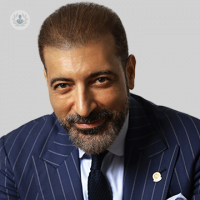All about andropause
Escrito por:Andropause, also referred to as testosterone deficiency syndrome (TDS) or “male menopause”, is when there is a drop in testosterone production around the age of 50 years old and upwards, causing a deficiency. One of London’s leading cosmetic and sexual aesthetic doctors explains andropause and how it can be managed in this article.

What is andropause?
Testosterone is one of the hormones that are produced in the sexual glands (the gonads), specifically the testes. During puberty and the years that follow, there are higher levels of testosterone which powers the growth of body hair, development of muscle mass, and causes the voice to deepen, for example. At some point, the gonads slow down the production of testosterone. Whilst this is normal as we age, men affected by andropause will feel the effects of this more keenly.
Unlike how menopause will inevitably and eventually occur in all menstruating people, andropause does not affect all males. Menopause is also more of a sudden halt in the production of oestrogen and progesterone, whereas andropause is rather a gradual decline of testosterone production.
What are the symptoms of andropause?
The symptoms of andropause include:
- Erectile dysfunction
- Low libido
- Depression or anxiety
- Mood swings or irritability
- Loss of muscle mass and stamina
- Redistribution of fat to the belly or the chest (gynaecomastia)
- Lack of energy
- Difficulty with sleep
- Fatigue
- Brain fog and short-term memory
Some less common symptoms are decreased testicle size and the loss of body hair. When there are low levels of testosterone and other sexual hormones in the body, there can be a risk of developing osteoporosis, which is a condition where the bones lose density and become very brittle.
What causes andropause?
Andropause can be caused by late-onset hypogonadism. Hypogonadism is when the gonads fail to produce the expected testosterone. Men who have obesity or diabetes are particularly susceptible to developing late-onset hypogonadism and undergoing andropause.
How is andropause diagnosed?
Andropause can be formally diagnosed after a blood test, where doctors will examine the levels of testosterone in the blood. Further tests may include checking for anaemia and iron in the blood, and a sperm count.
How is andropause treated?
If the condition is not majorly affecting a patient's quality of life, there may be no medical intervention necessary. To manage the symptoms, the patient may need to adjust their lifestyle to reduce stress and to try and improve their general diet, physical activity, and sleep.
The mental toll of andropause is likely to be the biggest hurdle. As andropause is not very well-known as a condition, there are not many discussions or platforms that uplift and centre this condition, leaving men without the vocabulary and space to express their concerns and struggles. In such cases, it is recommended that patients seek out support for men struggling with andropause, such as communities or counselling. Talking about the symptoms and issues with a GP can help to break the silence and open up access to resources.
For those who are severely affected by their andropause in regards to their health, wellbeing, and relationships, then testosterone replacement therapy (TRT) could be implemented to manage the symptoms. In TRT, synthetic versions of hormones are used to augment the low levels of hormones – in this case, testosterone. It can be administered as oral medication, intravenously, topical gels and patches.
However, TRT may not be suitable for those who have prostate cancer as it will encourage the growth of those cancer cells.
If you are looking for support or treatment options for andropause, you can consult with a specialist via Top Doctors.


